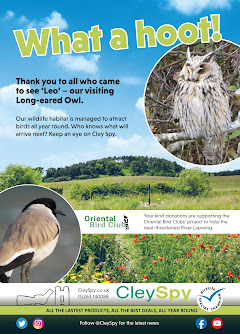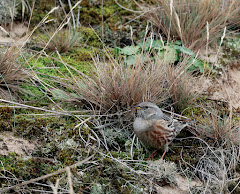Its lovely to see my father's Nature Notes now on line (this is the second one, see my previous link for first one), but slightly annoying that they are only able to add one of his three pictures that he submits each time.
Link here: http://www.lynnnews.co.uk/lifestyle/nature_notes_1_2581292
Or here:
"I AM always astonished at the capabilities of wildlife to survive the worst of our erratic climate.
Last December and January I feared for the survival of two delicate resident warblers. I am pleased to record that both dartford warbler and cetti’s (pronounced chetti’s) warblers have been seen and heard in their North-West Norfolk habitats.
Other small passerines also seem to have survived the intense frosts and I have little doubt that multitudes of garden offerings of nuts, seed and fatballs have helped their survival. The long-tailed tit is another frail species that has easily survived. We had regular numbers of these charming birds passing through our garden and clinging to our net feeders more than usual. Now, they are in pairs looking for nesting sites in bramble and gorse bushes. Blue and great tits also continue to enjoy our hospitality, seeking out a suitable nesting box in which to rear their young.
But it is not always realised that our garden activities can be in direct conflict with the natural inhabitants. Hedge cutting should be left until August at least. If allowed to blossom, privet will attract many bees and other insects. Ivy should be treasured as a vital source of food and cover for birds and insects.
Pesticides and herbicides are probably responsible for a decline of many species. Gardens and arable fields are strewn with these deadly chemicals. Herbicides harmful? Without doubt. They will destroy all the smaller weeds (wild flowers) such as dandelion, chickweed, groundsel, nettles and speedwells etc. These plants themselves support a multitude of small invertebrates including tiny caterpillars of moths on which tits and other species feed their young.
It is likely that the decline of many species is due to the indiscriminate destruction of lesser creatures in the wildlife food chains. A chorus of 20 or more song thrushes was a delightful spring event in this parish, but that was three or four decades ago. It is terrible that many youngsters of today may never see the mud-lined song thrush’s nest built in an old holly tree or ivy clump and containing four or five sky blue eggs marked with black dots.
The untidy gardener will have more wildlife than a tidy one. Leave fallen logs on the ground. Leave dead or rotten trees for woodpeckers and tree creepers. A pool of fresh, clean water is essential for birds to drink or bathe in. Or better still make a small pond, fringed with non-invasive water-plants.
Moth recorders in this coastal area do not usually expect to see more than single numbers coming to mercury-vapour lights in March and possibly no more than a dozen or so per night in April. Therefore, I was greatly surprised to count no less than 76 moths of eight species on March 22. The next day I recorded 108 moths which are the highest numbers that I have had so early for many years. These moths had spent the winter in their pupa either in rough ground herbage or actually in the ground. One moth, the pale pinion, had spent the winter hibernating as an adult insect. This really shows how resilient they can be to survive so well in that cold. A factor might be that they were extra safe from predators because of the iron hard ground. Oddly enough we have only seen one or two brimstone butterflies emerge from hibernation but butterflies do not pass the winter in the ground. They prefer hollow trees, old barns and thick bushes.
PETER CLARKE"








































No comments:
Post a Comment